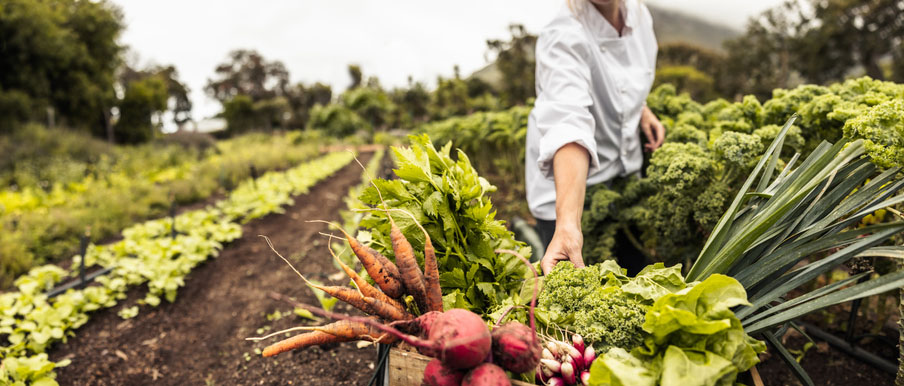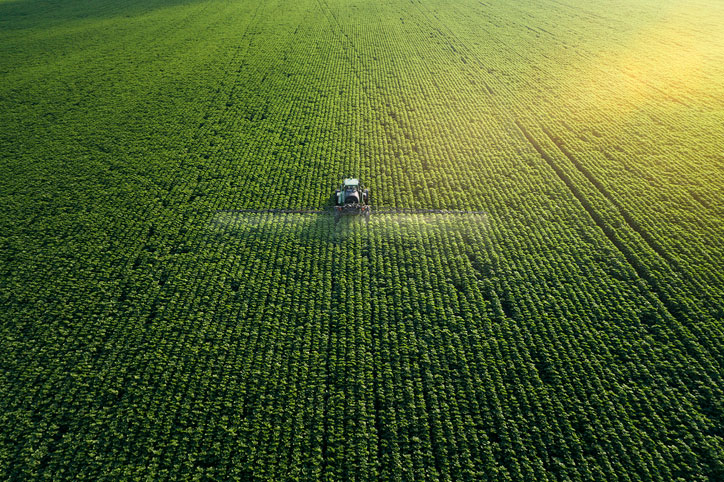In response to growing concerns about climate change alongside widespread dietary concerns, a new effort has arisen to address these dovetailing issues. What was once a local level grassroots cause has become a global movement known as sustainable nutrition, a system intended to better not only our health but our planet. 
What Is Sustainable Nutrition?
Sustainable nutrition is an approach to eating that aims to utilize the world’s resources without depleting them or causing other kinds of environmental damage. It is designed to combat the tremendous harm that many methods of food production have caused the planet, ensuring that future generations will continue to be able to have access to natural sources of nutrition.
In thinking about sustainability, there are four main factors that proponents of sustainable nutrition consider:
- Individual health and nutrition
- Environmental concerns
- Economic dynamics
- Socio-cultural context
You can see that beyond personal nutrition and eco-friendly production practices, the sustainable nutrition movement is also focused on issues of equity and access, aiming to reshape our global approach to food so that everybody is able to eat a healthy and sustainable diet.
The following bachelors and Master’s programs offer career-focused instruction delivered by trained nutritionists with experience in the field. Find out more what each individual course of study offers through the locations below.
Purdue Global's Bachelor of Science in Nutrition Program is an approved holistic nutrition education program through the National Association of Nutrition Professionals (NANP).
Arizona State University - Online offers an Online Masters in Medical Nutrition
UNC's MPH Nutrition concentration prepares students to provide, evaluate and communicate nutritional and dietary guidance that improves individual and population-wide health outcomes. In addition to developing their knowledge of nutrition science, students will explore behavior change, communication, counseling and the effects of dietary culture on individuals and communities.
Rasmussen University offers a Bachelor's Degree in Health & Wellness.
Grand Canyon University offers an M.S. in Nutrition and Dietetics.
Walden University's Bachelor of Science (B.S.) in Health Studies - Health Promotion and Wellness gains job-ready, immediately applicable skills today's employers want.
To learn more about the different dimensions of sustainable nutrition, read on.
Personal Health and Nutrition
In conceiving of a sustainable food system, one of the fundamental guiding principles must be health and nutrition. Around the world, high rates of obesity as well as malnutrition can be found, as well as life-threatening conditions caused by unhealthy diets. The World Health Organization reported that in 2106, 1.3 billion adults were overweight or obese, and 462 million adults were experiencing malnourishment and malnutrition. Designing sustainable eating habits for the planet therefore means assessing the needs of diverse demographics and implementing initiatives that respond to their dietary needs. Below are just a few of the biggest areas of focus for sustainable nutritionists. 
Overconsumption and “Addiction” to Sugar and Salt
The US Department of Health and Human Services reports that two out of every five adults and one out of every five children has obesity, a condition that is caused by overconsumption and a high-calorie diet. Obesity has been linked to a wide variety of serious diseases and conditions including type 2 diabetes, heart disease, strokes, and cancer. Some demographics have been found to be more likely to have obesity and therefore are at greater risk of developing these conditions. Many of these diseases can also be caused by an unhealthy diet even for those not struggling with obesity. Those who consume too much sugar – especially children – are at risk of cardiovascular disease and diabetes. In developing sustainable nutrition practices, it is imperative to design new diets that lower overall sodium and sugar intake and provide more nutritious options to populations with high rates of obesity.
High Quality Proteins
Protein is an essential part of any diet. For children, proper protein intake is necessary for healthy growth. For adults, it is a primary source of energy. Consuming more protein can also help people lose weight. The US Department of Health recommends that each person eat 0.8 grams of protein for every kilogram they weigh. For a person weighing 165 pounds, that would mean 60 grams of protein per day. Making a protein-rich diet available in the long term is an important factor for those focused on sustainability and nutrition. Some examples of high quality sustainable proteins are the following:
- Beans
- Lentils
- Eggs
- Soy products
- Tofu
- Seaweed
You may notice that no meat is listed among these ingredients, and that eggs are the only dairy products among them. Indeed, it is often recommended to turn to a plant-based diet when looking to adopt sustainable eating habits. For more information about plant-based nutrition and its relationship to environmentally friendly farming practices, read the “Environmental Considerations” section below.
Implementing Fibers
Fiber is an important part of a healthy diet, providing a whole range of benefits to the body including aiding with important digestive processes, lowering cholesterol, and even helping prevent some forms of cancer. Despite its many health benefits, many Americans already struggle to get the proper amount of fiber. Harvard’s School of Public Health reports that while the average adult needs between 25 and 35 grams of fiber per day, many adults are only consuming around 15 grams per day. This shows that thinking about sustainability and nutrition is also an occasion to improve our existing nutrient intake, in this case by designing diets that contain more fiber for the majority of people. Below are some sustainable foods that contain large amounts of fiber:
- Oatmeal
- Nuts
- Lentils
- Flax seeds
- Quinoa
- Brown Rice
- Kale
If these are already incorporated into your diet, it’s time to take the next step to be sure that your sourcing is meeting the highest standard of sustainable nutrition. Learning about the farming practices behind your produce is the best way to determine if your go-to ingredients are making a positive or negative impact on the planet.
Age-Based Nutrition
Nutritional needs vary greatly by age, body type, and genetics, as well as life events like pregnancy. One of the great challenges of developing a thorough plan for sustainable nutrition is that a good system must be able to meet the great variety of nutritional needs faced by people in vastly different demographics and stages of life. For information on official recommendations for nutritional intake by age type and stage of life, take a look at the US Department of Agriculture’s index.
Chemicals and Preservatives
Chemicals and artificial preservatives are a major part of large-scale agricultural practices, though they are known to be harmful to our health. Some pesticides have been found to harm the nervous system and eyes, while others have even been found to be carcinogenic. Though chemicals used in farming are under scrutiny, they are still very much in use. In addition to being harmful to our health, using chemicals and preservatives is not sustainable for the environment, as many of these agents can ultimately cause long-term damage to the land, making it unfarmable. 
Environmental Considerations
Many of the environmental benefits of a sustainable approach to food are outlined in the health benefits listed above. But there are even more ways that thinking about sustainability and nutrition go hand in hand to protect the planet. In some cases, these areas of concern address factors outside of food itself but related to food, from production methods to waste.
Food Waste
In addition to solving the issue of human food consumption, it’s equally important to address the issue of human food waste. This is likely to vary by community, as waste management systems vary greatly from place to place. What’s imperative is that the issue of food waste be considered at the same time as dietary concerns, as the two are intimately connected.
The Move to Plant-Based Nutrition
Many of the solutions to our crisis of resources and human health points to a shift to plant-based nutrition. Indeed, the sustainable forms of protein listed earlier in this article are all plant-based, and are proven to have significant health benefits without the harmful environmental impact of meat. That being said, many who are involved in the conversation about sustainability and nutrition, including researchers at Wageningen University in the Netherlands, argue that there is still a place in our ecosystem for the livestock sector, though on a greatly reduced scale from our current large-scale farming practices. Still, unless you are getting fresh meat from a local farm, if you are looking to cultivate sustainable eating habits, you are likely to rely upon plant-based nutrition.
Reducing Carbon Footprint
One of the most important places that the issues of sustainability and nutrition converge is in the carbon footprint of the agricultural industry. Animal farming in particular has been found to have disastrously harmful effects on the environment, producing 65% of the world’s nitrous oxide emissions annually, according to a report from the University of Colorado Boulder. Farming is how humans have derived their food for millennia, and there are many farming practices that do more than merely avoid harming the land but actively improve it. The question is of how to draw from those practices and adapt them to suit the contemporary needs of our planet. While it will take much advocacy and grassroots-led pressure to change how these systems are affecting our ecosystem on the broadest scale, you can play your part by developing sustainable eating habits that lower your carbon footprint. This is where plant-based nutrition is often the answer: on average, vegans and vegetarians have a significantly lower carbon footprint than meat-eaters.
Sustainable Shopping and Home Items
When thinking about the environmental impact of food, it’s important to reflect on the other food-related items that we use every day. Though compostable and recyclable straws are becoming more common, single-use plastic remains a huge source of non-degradable waste. To reduce waste, invest in reusable products from food containers to shopping bags so that your food habits won’t continue to produce non-degradable waste. Be sure to select items that are as convenient to use as their single-use plastic counterparts so that you actually incorporate them into your routines. 
Economic Considerations
Beyond just discussing its relationship to health and the environment, the conversation around sustainability and nutrition emphasizes that this movement is related to economic questions as well.
Food Deserts
As it stands, we are all significantly economically impacted by our existing food systems, as the price of food is a great determining factor on our lives. When a community does not have access to affordable nutritious food, it is called a food desert. This can be because of low average incomes in the community, a lack of transportation to the nearest healthy grocery store, or a combination of the two. These communities often experience high rates of obesity and health issues related to poor diet, as individuals only have access to unhealthy foods. To develop nutrition practices that are truly sustainable means opening up access to healthy food for all people, both by making healthy food more affordable and creating locations to buy healthy food in communities that don’t have them.
Malnutrition
Malnutrition is defined by the World Health Organization as undernutrition, micronutrient-related malnutrition, and overweight and obesity-related diseases. The WHO goes on to explain that “the developmental, economic, social, and medical impacts of the global burden of malnutrition are serious and lasting, for individuals and their families, for communities and for countries.” Clearly, as important as the issue of nutritional intake is the issue of access. To put it plainly, communities that exhibit high rates of malnutrition are suffering from a lack of resources, both monetarily and in the food available to them. New standards of sustainability and nutrition need to ensure that the products of better farming practices are distributed more equally, to prevent the crisis of malnutrition that has arisen in societies all over the world.
Want to Develop Sustainable Eating Habits?
If learning about sustainability and nutrition makes you feel inspired to revise your eating habits, take a look at our guide to crafting the perfect nutrition plan to accommodate your needs and your lifestyle. Meanwhile, if you are motivated by learning about the many different dimensions of how food impacts both our health and the planet’s, you may be inspired to pursue a career in nutrition. The rise in interest in sustainability and nutrition means that there are many great new jobs for nutritionists, who can help individuals build sustainable eating habits of their own. Take a look at our guide to becoming a sustainable dietitian here.